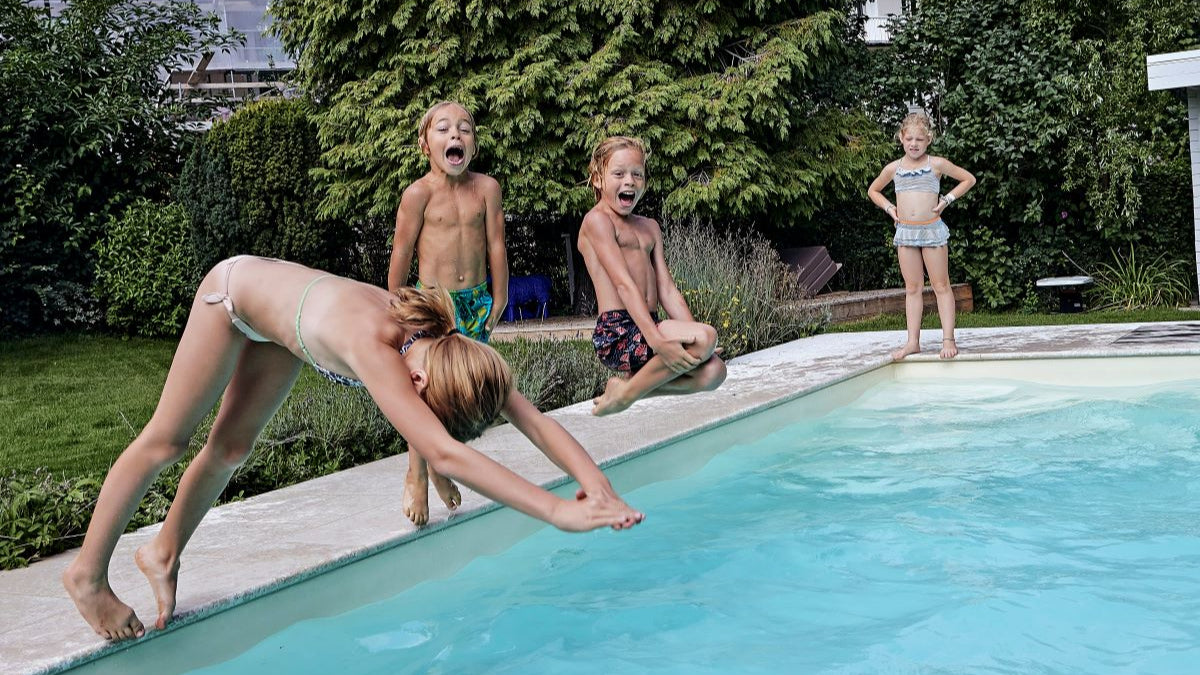As wonderful as the fresh water is on a hot summer day, and as good as the cooling is for our circulation, splashing and swimming aren't always soothing for our skin. Prolonged or repeated contact with water can damage the skin's natural acid mantle and wash away its natural oils. Dry skin, tightness, itching, and white flakes are often the result.
As adults, this bothers us so much that we immediately start searching for the right skincare product. But children, who have even more sensitive skin, often don't even notice how dry their skin is. They're far too busy having fun.
Here are some tips from Dr. Kerstin Schallaböck, general practitioner, mother of four, and KAMI skincare founder, on how to make a day at the beach gentle on your skin.
"In our latitudes, we mainly splash around in swimming pools. Unfortunately, the needs of our skin and those of the pool are far apart.
The optimal pH value of pool water should be between 7.0 and 7.4, which limits the growth of bacteria, algae, and other microorganisms. However, this pH value is far from ideal for the skin; it should be in the slightly acidic range of approximately 5.5 to maintain its resistance. The addition of chlorine as a cleaning and purifying agent also poses other risks: Some people, often those with atopic dermatitis or other chronic skin problems, also suffer from a chlorine allergy and therefore sometimes react with hives, itching, rashes, and redness.
But even with normal skin, contact with chlorinated pool water leads to significant moisture loss. This can be observed after about an hour; with dry or very sensitive skin, the effect often occurs much more quickly.
So what should you do if your skin is dry after swimming?
The only alternative is to care for your skin thoroughly during and after a day at the beach.
- Be sure to shower with fresh water after every swim in the pool, then either just pat dry or let your skin air dry.
- Change your swimwear, otherwise you risk bladder or kidney problems. Furthermore, wet long swim trunks can cause skin eczema in boys due to rubbing.
- Then apply care!
- Heavy creams and body lotions can be uncomfortable in hot weather. You can practically feel your skin becoming blocked and sweating on the surface. Therefore, light, moisturizing lotions that absorb quickly are best.
- Sprays are particularly convenient for children (and men) because they can be applied and distributed quickly.
I also always recommend natural products, especially those containing aloe vera, like our KAMI 2-Phase Spray. Aloe vera not only provides a great deal of moisture, but also has soothing and anti-inflammatory properties.
In the evening, when you shower, use a pH-neutral, moisturizing shower product, such as our KAMI Wash Fluid, and be sure to moisturize your skin from head to toe again. For children, I have trick 17 : To make applying moisturizer more pleasant for them, add a few drops of skin care oil to the bathwater. This won't spoil the bathing experience, and you can skip the tedious task of applying moisturizer afterward because the bath will have already distributed the moisturizer! Our KAMI Skin Care Oil is perfect for this.
For anyone with their own pool, here's a tip: Saltwater pools are already very advanced. They're not nearly as labor-intensive as they used to be and are much better for your skin. It's an investment that pays off, especially if family members have skin problems.
Swimming in the sea is, of course, much healthier for the skin. Salt has a mild anti-inflammatory effect, loosens dead skin cells (acts like an exfoliator), and draws fluids from inflamed skin. Furthermore, the sea air is rich in moisture. All of this has a positive effect on dry, rough skin.
However, be careful if you have open wounds or eczema: The salt water can burn or soften the skin if you stay in the water for too long, allowing germs to penetrate.
The combination of sun, salty seawater, and aerosol-rich sea air can improve the symptoms of atopic dermatitis and have a positive stimulating effect on the body. Salt water baths can also have a similar effect.
However, if you go on a beach holiday without tanning and/or in extreme heat, you should of course be especially careful.
- Waterproof sunscreen should be a given, and don't forget to reapply sunscreen.
- In the midday heat, don't go into the sea or pool, but play a game of UNO inside, for example.
- After every swim, shower, change wet swimwear and apply sunscreen.
By the way, a holiday at one of our beautiful Austrian lakes with drinking water quality isn't just good for the environment: Freshwater is less aggressive than salt or chlorinated water and therefore best for our skin!
Nevertheless, it is still important to give your skin sufficient “care” at the end of a day at the beach.
We wish you lots of swimming fun and a wonderful summer
Yours, Kerstin Schallaböck








